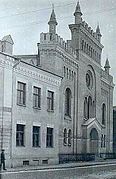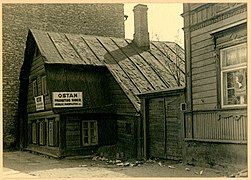Maakri
Maakri | |
|---|---|
Subdistrict of Tallinn | |
 Maakri (2012) with its high-rises (from left to right): Radisson Blu Sky Hotel, SEB Estonia headquarters, Maakri 36, Swissôtel Tallinn and Nordea Estonia headquarters. | |
 Maakri within the district of Kesklinn (Midtown). | |
| Country | Estonia |
| County | Harju County |
| City | Tallinn |
| District | Kesklinn |
| Area | |
• Total | 013 km2 (5 sq mi) |
| Population (01.01.2022) | |
• Total | 1,099 |
Maakri is a subdistrict (Template:Lang-et) in the district of Kesklinn (Midtown), Tallinn, the capital of Estonia. It has a population of 1,099 (As of 1 January 2022[update]).[1] In the last decade Maakri has developed into the main business centre of Tallinn. Many high-rise buildings have been built into the area during this period.
History
Maakri subdistrict is named after the Macker family, who owned a painting workshop located at Maakri 23.[2]
The latter part of the 19th century saw Maakri become home to many shops and industrial factories, as well as to the first Great Synagogue of Tallinn, which was built in 1884 and destroyed in the 1944 March bombing.[3] Maakri was also home to the Tallinn Paper Factory, which was located on the site of the current Stockmann department store, and to Theodor Grünwald's leather and footwear factory, which today has been redeveloped as Maakri Kvartal.[3][2]
After the Estonian Restoration of independence, many high-rise buildings have been built in the Maakri area. In 1999, the first high-rise was completed - the 94-metre tall SEB Pank headquarters.
Skyscrapers and high-rises
Maakri is home to the majority of the tallest buildings in Tallinn.
| Building | Height | Year completed |
|---|---|---|
| Swissôtel Tallinn | 117 m | 2007 |
| Tornimäe 7 | 117 m | 2007 |
| Maakri Kvartal | 110 m | 2018 |
| Radisson Collection Hotel | 105 m | 2001 |
| Skyon | 95 m | 2021 |
| SEB Pank | 94 m | 1999 |
| Maakri Maja | 72 m | 2003 |
| Maakri HUB | 58.6 m | 2000 |
| Luminori Maja | 54.2 m | 2009 |


Furthermore, a number of high-rise buildings such as Hotel Olümpia (84 m), City Plaza (78 m), Hotel Viru (74 m) and Novira Plaza (53 m) are situated in the close proximity to the Maakri subdistrict, meaning together they form a consistent skyline of the Tallinn city centre.
The future of Maakri sees the density of high-rise buildings increase, as a number of proposed projects are in development, such as a 30-floor Lauteri 3 development by EBS, a 36-floor Maakri 29 development by the Estonian Evangelical Lutheran Church and a cluster of high-rise buildings planned by Capital Mill on the site of the area between Lennuki and Maakri streets.[4]
Gallery
- Historical Maakri
-
The Great Synagogue of Tallinn was built in 1884 and destroyed in the March bombing of 1944
-
The Synagogue was located at the corner of Sakala and Maakri streets
-
The old chimney of the Tallinn Paper Factory, located next to the Stockmann department store
-
Maakri 23, built in 1910 and one of the best examples of art nouveau architecture in Tallinn
-
Maakri 19-21 was the location of the Theodor Grünwald's leather and footwear factory, later named "Union"
-
Wooden houses of Maakri in 1938
-
Old wooden houses of Maakri in 2006, majority of them have been destroyed
-
Wooden House in Maakri 34 on 8 August 2002
-
Church of St. John's almshouse from the 17th century.
- Modern Maakri
-
Maakri Maja in the winter of 2010
-
Estonian Flag on the Wall of Maakri 36 in Tallinn 24 February 2017
References
- ^ "Statistical Yearbook of Tallinn". Tallinn. Retrieved 2023-02-12.
- ^ a b "Mitu pilvelõhkujat mahub Tallinna?". Äripäev (in Estonian). Retrieved 2023-02-12.
- ^ a b Nero, Robert; Lõhmus, Leho (2013). Tallinna asumid ja ametlikud kohanimed. Tallinn: Tallinna Linnaplaneerimise Amet.
- ^ "Tallinna hinnalisim krunt. Südalinna tuntuima "hambaaugu" saaga saab lahenduse. Mis sinna kerkib?". Ärileht (in Estonian). Retrieved 2023-02-12.












